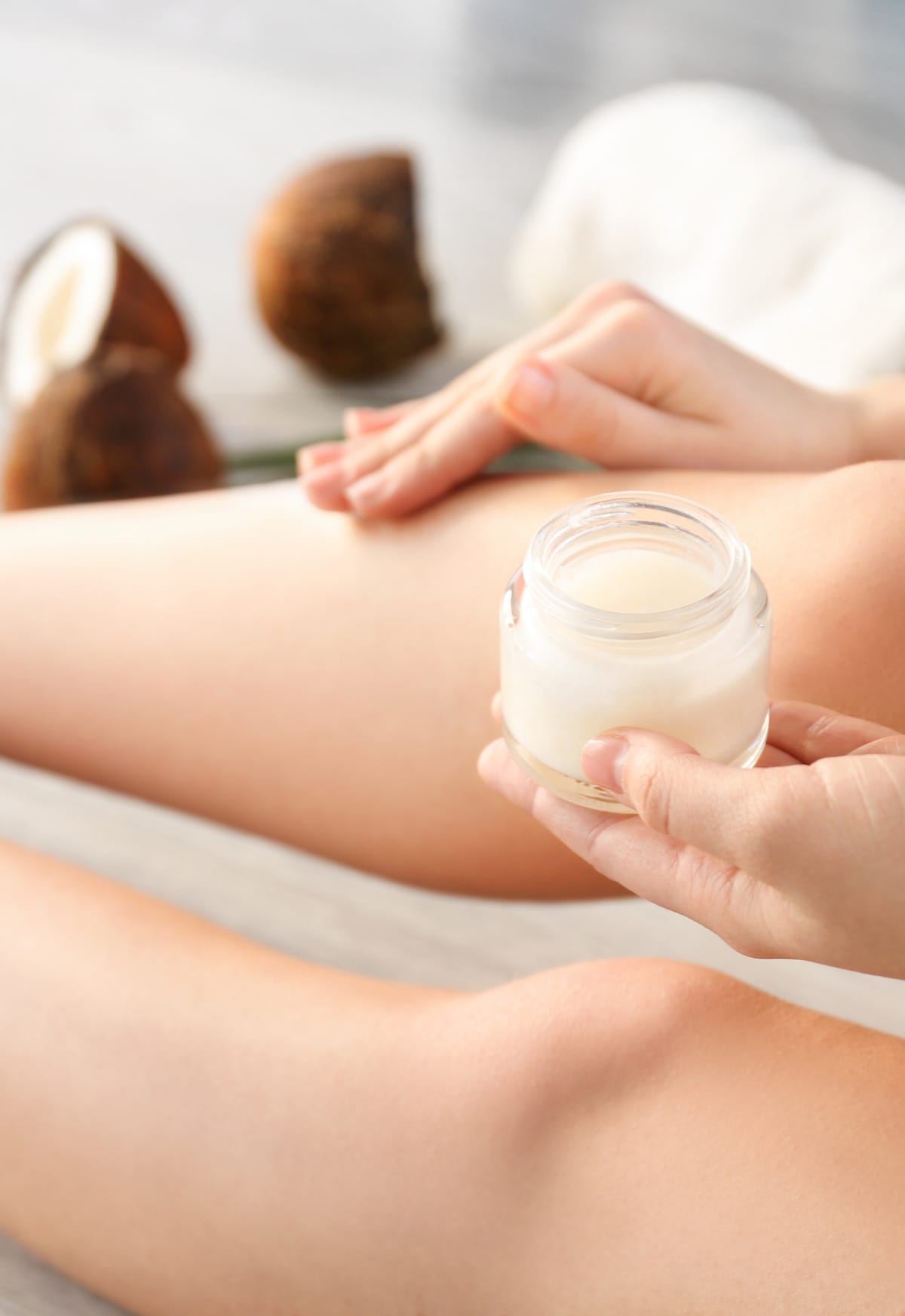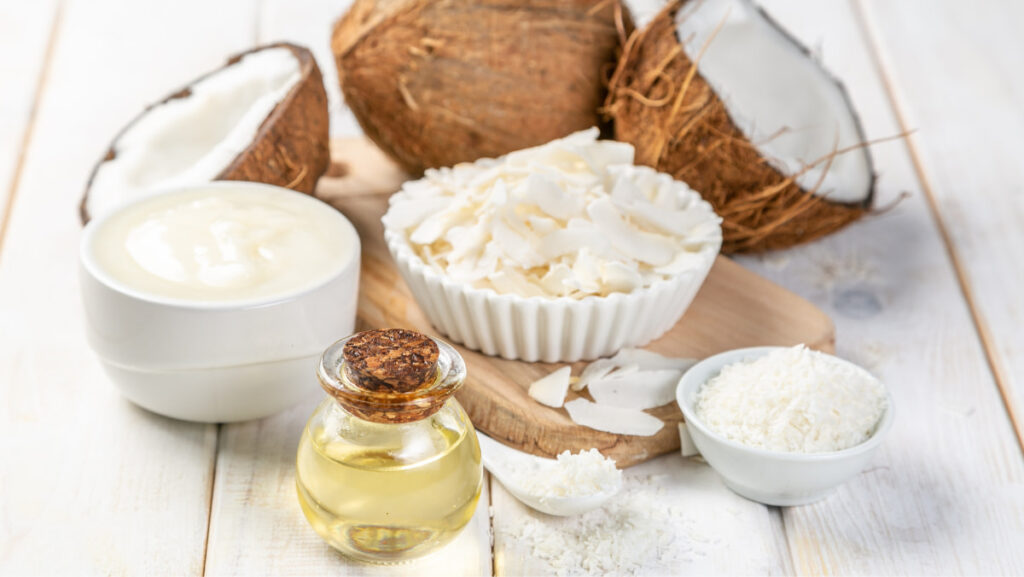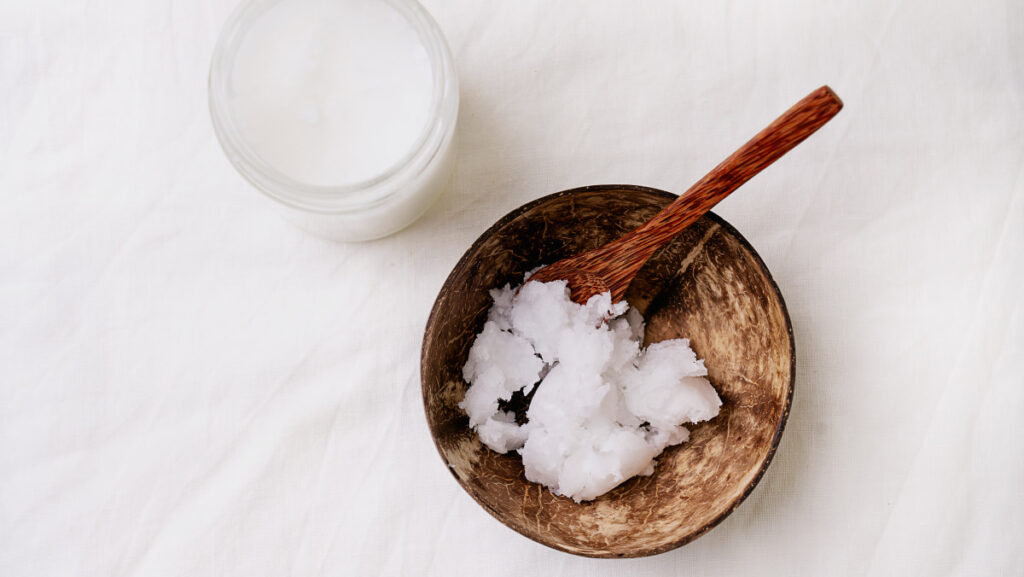
Coconut oil has become the all-natural holy grail for nail, hair, and skin health. However, much debate exists about how safe it is for acne-prone skin. You might have heard mixed opinions on whether or not coconut oil clogs pores.
Some swear by its promising properties, while others steer clear, fearing breakouts and clogged pores. But what’s the real truth? Does coconut oil clog pores?
To get to the bottom of this, it’s essential to understand the factors that contribute to clogged pores as well as the properties of coconut oil. Pores can become blocked by excess sebum (oil) production, dead skin cells, sweat, and dirt.
Coconut oil, being an oil itself, has a reputation for potentially contributing to this issue. However, it’s not as black and white as it seems.
Still, its beneficial properties, such as antioxidants and antimicrobial effects, have been reported to improve skin conditions, even acne.
If you want to find the solution to this complicated riddle, follow me as I try to give a verified answer to the question: Does coconut oil clog pores?
So, Does Coconut Oil Clog Pores?
Let’s start right off the bat by addressing this question. Does coconut oil clog pores, or is it just another skincare rumor?
Coconut oil comprises 95% of saturated fats, mainly lauric, myristic, caprylic, capric, and palmitic acid. Its composition makes coconut oil very thick and hard to absorb by the skin.
Studies on the comedogenicity of coconut oil have unfortunately confirmed our fear. Coconut oil is considered highly comedogenic and should be avoided by oily and acne-prone individuals.
Another unexpected hit is that all forms of coconut oil seem to have the same comedogenic properties. This includes virgin (non-processed) coconut oil, which was generally considered non-comedogenic!
Let’s talk about numbers using the comedogenic rating to put this into perspective. FYI, comedogenic rating measures how likely a substance is to clog your pores. The scale ranges from 0 (non-comedogenic) to 5 (highly comedogenic).
Coconut oil has a rating of 4, which suggests it might clog your pores. Therefore, it should be avoided by individuals with oily or acne-prone skin.
Let’s compare comedogenic ratings between oils that have been loved in skincare to see where coconut oil stands:
| Oil | Comedogenic Rating |
| Coconut Oil | 4 |
| Jojoba Oil | 2 |
| Argan Oil | 0 |
| Olive Oil | 2 |
However, it’s important to remember that not everyone’s skin reacts the same way to specific ingredients. Different factors like skin type and individual sensitivity significantly determine how your skin reacts to coconut oil.
If you are still willing to give coconut oil a try, it’s essential to conduct a patch test first. Apply a small amount of oil on a discreet area of your skin to see how it reacts. If you notice clogged pores or breakouts after a few days, it might not suit you.
For those with acne-prone or sensitive skin, it’s best to consult a dermatologist or skincare expert before making any significant changes to your routine.

Understanding Comedogenicity
We have established that coconut oil does clog pores. But why and how can this lead to acne? Here is where the concept of comedogenicity comes in handy.
Comedogenicity measures a substance’s ability to clog pores and potentially cause acne. But how does the one lead to the other?
The skin naturally has pores, essentially the exit point of hair from our skin. At the root of those pores, there are sebaceous glands producing sebum.
When these pores become clogged with excess sebum, combined with dead skin cells, trouble brews. This clogging creates a breeding ground for a notorious bacteria, leading to inflammation and, eventually, acne.
But what determines whether a substance clogs your pores? Enter the concept of comedogenicity.
It assesses a substance’s propensity to clog pores and cause acne. To simplify this evaluation, a scale ranging from 0 to 5 is used. A rating of 0 signifies non-comedogenic, while 5 indicates a high likelihood of causing acne.
Here’s a simple breakdown of the scale:
| RATING | DESCRIPTION |
| 0 | Non-comedogenic |
| 1 | Low risk of clogging pores |
| 2 | Moderately low risk |
| 3 | Moderate risk |
| 4 | Fairly high risk |
| 5 | High risk, likely to cause acne |
Coconut oil ranks at a four on this scale, posing a fairly high risk of clogging pores. And this holds true for all types of coconut oil, including unrefined and refined coconut oil.
How Do You Use Coconut Oil To Not Clog Your Pores?
I know you did not like the answer science gives to the question, “Does coconut oil clog pores?”. But can you use coconut oil in a way that does not clog your pores? Do not lose hope because the answer is yes!
If you have oily or acne-prone skin, your best bet would be to avoid using coconut oil directly. But you still can reap the benefits if you find it formulated in a skincare product suitable for your skin type.
What About Acne-Prone Skin And Coconut Oil?
So, what is the place of coconut oil in skincare for acne skin? There is no direct evidence that coconut oil can help in the treatment of acne, despite its impressive benefits. I would, therefore, suggest opting for an alternative oil better suited for your skin type.
6 Benefits Of Coconut Oil For Your Skin
So, why is there such a frenzy around coconut oil? Are the skin benefits of coconut oil truly so great? Let’s explore some of the advantages of incorporating coconut oil into your skincare routine:
Coconut Oil Is A Natural Moisturizer
Coconut oil is known to be an excellent moisturizer because of its rich fatty acid content. These fatty acids help to lock in moisture, decreasing transepidermal water loss, making it great for dry or atopic skin.
Coconut Oil Boasts Antimicrobial Properties
Thanks to its lauric acid content, coconut oil exhibits antimicrobial properties beneficial for both topical and oral use.
This can help protect your skin from harmful bacteria causing troubling skin conditions, including acne, and promote a clearer and healthier complexion.
Coconut Oil Is Anti-inflammatory
According to research, coconut oil has anti-inflammatory properties that can help soothe irritated and inflamed skin. It also protects the skin barrier function, preventing contamination.
If you suffer from conditions like eczema, psoriasis, or dermatitis, incorporating coconut oil into your skincare routine might provide some relief.
Coconut Oil Has Antioxidant Benefits
According to research, coconut oil possesses strong antioxidant properties. With antioxidants like vitamin E, coconut oil can help protect your skin from oxidative stress and reduce the signs of aging.
Coconut Oil Helps In Wound Healing
The topical application of coconut oil on skin wounds is shown to promote faster epithelization and healing. Coconut oil increases collagen production and exerts topical antioxidant properties, decreasing the healing time.
Coconut Oil Can Be Used As A Gentle Makeup Remover
Tired of harsh makeup removers irritating your skin? Coconut oil is a gentle alternative that effectively removes makeup without causing irritation or dryness.
Pro tip: To make the most of these benefits, consider using organic, cold-pressed, and unrefined coconut oil (virgin coconut oil). Virgin coconut oil is the least processed and retains the most nutrients to help nourish and protect your skin. It’s worth noting that many of the referenced studies have utilized virgin coconut oil, further emphasizing its superiority.
Best Products Containing Coconut Oil
- SheaMoisture 100% Virgin Coconut Oil Daily Hydration Foaming Facial Wash: This face wash is like a refreshing, bubbly treat for your skin! Made with pure coconut oil, it helps keep your face clean and hydrated every day, giving you a fresh and glowing complexion.
- Kopari Coconut Crush Scrub: If you want super smooth and soft skin, this scrub is the way to go! It’s like a gentle sandpaper made from coconut that removes dead skin cells and leaves your body feeling silky and happy.
- e.l.f. Hydrating Coconut Mist: Imagine a light mist that smells like a tropical vacation and hydrates your skin at the same time! That’s exactly what this coconut mist does, making your face feel refreshed and moisturized with just a spritz.
- Herbivore Coco Rose Coconut Oil Body Polish: This scrub is like a special treat for your body, as it combines the goodness of coconut oil with a hint of rose. It exfoliates your skin gently, leaving it smooth, nourished, and smelling divine.
- Mario Badescu Coconut Body Oil: When your skin needs some extra love, this coconut body oil comes to the rescue! It’s like a soothing massage for your skin, keeping it moisturized and glowing all day long.
- Kopari Organic Coconut Melt: Meet the ultimate multitasker! This organic coconut melt can be used for so many things, like moisturizing your skin, conditioning your hair, or even as a gentle makeup remover. It’s like having a jar of coconut magic at your fingertips.
- RMS Raw Coconut Cream: This is like the purest form of coconut goodness for your skin. It’s a luxurious cream that melts on contact, giving your skin a boost of hydration and making it feel soft and nourished.
- SheaMoisture 100% Virgin Coconut Oil Leave-In Treatment: Say hello to happy and healthy hair! This leave-in treatment with coconut oil is like a superhero for your locks, keeping them moisturized, shiny, and protected from damage.
- IGK Rich Kid Coconut Oil Gel: If you want that cool, effortless beach hair look, this coconut oil gel is your best friend! It’s like a styling gel infused with the goodness of coconut oil, giving your hair texture and hold without any crunchiness.
- Briogeo Scalp Revival Charcoal + Coconut Oil Micro-Exfoliating Shampoo: This shampoo is like a spa day for your scalp! It gently exfoliates and cleanses your scalp, while the coconut oil nourishes and keeps it healthy. Your hair will thank you for this refreshing treat.

Alternatives To Coconut Oil
While coconut oil has gained popularity as a skincare staple, it’s not suitable for everyone. If you’re concerned about pore-clogging or allergic reactions, there are safer alternatives you can consider.
With various options available, here are five great alternatives to coconut oil for skincare:
Argan Oil
Argan oil is well known for its high levels of vitamin E and fatty acids, making it perfect for moisturizing and nourishing your skin.
It’s lightweight and non-comedogenic, meaning it won’t clog your pores like coconut oil might. This oil is ideal for both oily and sensitive skin types.
Jojoba Oil
Although you might think of jojoba oil as an oil, it’s technically a wax that closely resembles our skin’s natural sebum.
Because of its similarity to sebum, it’s easily absorbed by the skin without clogging pores, making it ideal for those who struggle with acne. It’s also gentle enough for sensitive skin and doesn’t cause irritation.
Sweet Almond Oil
Sweet almond oil is another excellent alternative to coconut oil. Rich in vitamin E, fatty acids, and antioxidants, it offers deep hydration and nourishment without clogging pores. This oil is gentle and suitable for most skin types, including dry and sensitive skin.
Grapeseed Oil
Grapeseed oil is a lightweight and non-greasy alternative to coconut oil. Packed with antioxidants and anti-inflammatory properties, it helps to balance the skin and reduce/redness and inflammation, even for those with oily or acne-prone skin.
Hemp Seed Oil
Hemp seed oil is typically cold-pressed and organically sourced to preserve its nutrients. With a high concentration of omega-3 and omega-6 fatty acids, it promotes skin health and moisture without clogging pores. This oil is recommended for those with sensitive or problematic skin.
Here’s a summary of these alternatives and their benefits:
| Alternative | Benefits |
|---|---|
| Argan Oil | High in vitamin E and fatty acids; moisturizing and non-comedogenic |
| Jojoba Oil | Resembles skin’s natural sebum; prevents acne; gentle on skin |
| Sweet Almond Oil | Rich in vitamin E, fatty acids, and antioxidants; hydrating and nourishing without clogging pores |
| Grapeseed Oil | Antioxidant and anti-inflammatory properties; suitable for oily skin |
| Hemp Seed Oil | High in omega-3 and omega-6 fatty acids; promotes skin health and moisture without clogging pores |
The next time you’re thinking about incorporating an oil into your skincare routine, consider giving one of these alternatives a try. These options help you avoid the risks associated with coconut oil while still reaping the benefits of hydrated and nourished skin.
Does Coconut Oil Clog Pores: Wrapping Up What We Know
So, does coconut oil clog pores? Coconut oil has a high comedogenic rating, meaning it can potentially clog pores for certain skin types.
People with oily or acne-prone skin may be more susceptible to experiencing clogged pores. On the contrary, those with dry or combination skin may have a more positive experience with it.
If you are determined to integrate coconut oil into your life, you may find that it is more beneficial for some areas of your body, such as elbows and knees, rather than your face.
If you’re curious and your skin isn’t highly prone to acne or excessive oiliness, it may be worth giving coconut oil a try on your face. However, it’s essential to conduct a patch test before application and choose high-quality virgin coconut oil.
If it doesn’t work for you, don’t give up. Remember that there are numerous other natural, non-comedogenic oils to choose from if coconut oil proves unsuitable for your skin type.
Frequently Asked Questions
